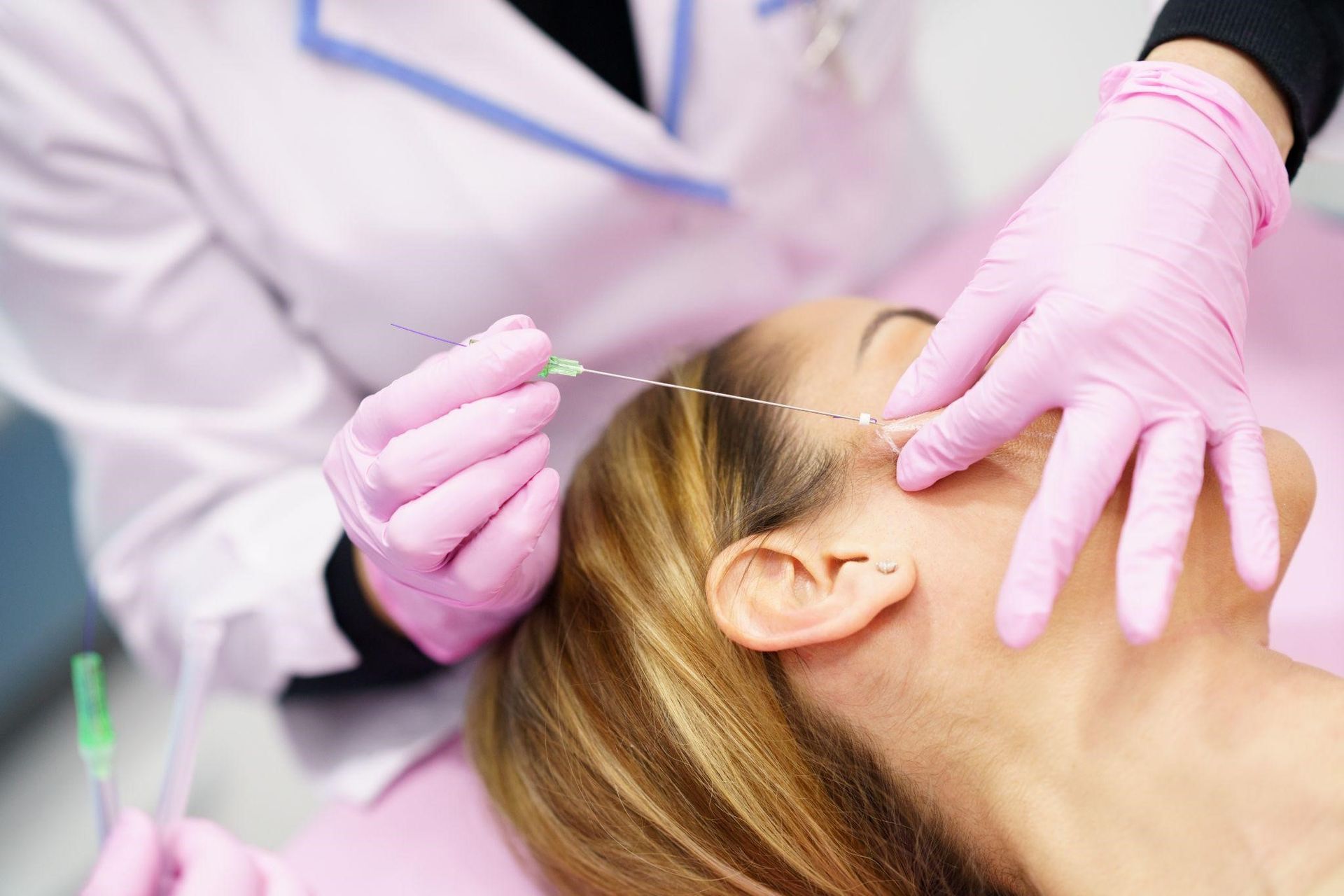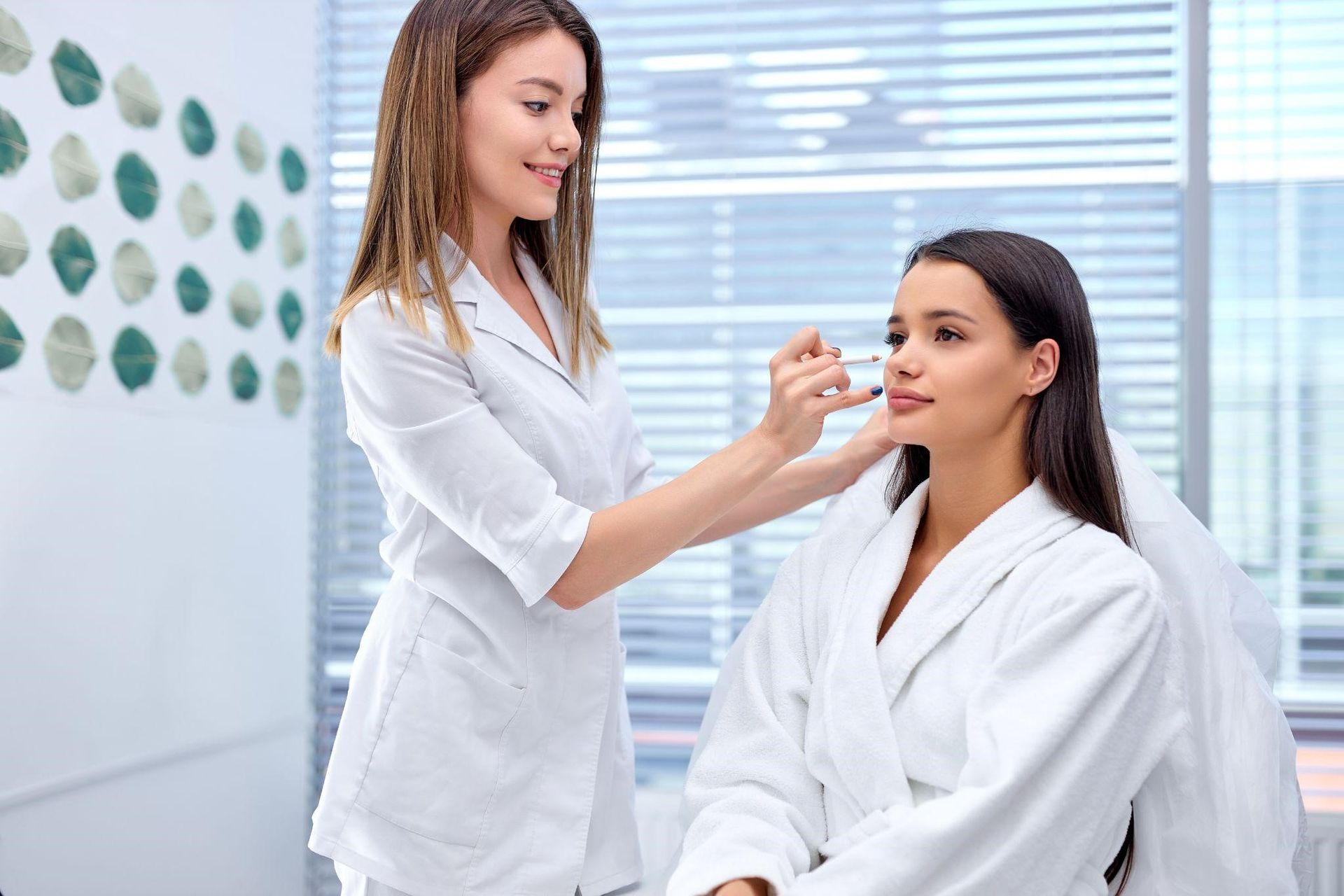2011 Lakepoint Way, Suite 201 Louisville, KY 40223
502-439-9575 By Appointment Only
502-439-9575 By Appointment Only
Looking for a way to lift and tighten your skin without surgery? Facial threading might be just what you need!
This popular treatment is giving people in Louisville a fresh, youthful look—without the long recovery time of a facelift.
In just one quick session, you can enjoy natural-looking results with minimal downtime. It’s an easy, non-invasive way to refresh your appearance and boost your confidence.
Overview of Non-Surgical Facial Rejuvenation
The desire for youthful skin has more people turning to non-surgical treatments. Instead of going under the knife, options like dermal fillers, Botox, and laser treatments offer an easy way to smooth wrinkles, restore volume, and refresh your look.
The best part? These treatments give noticeable results with little to no downtime, so you can get back to your day without missing a beat.
What is Facial Threading?
Facial threading is a cosmetic procedure designed to lift and tighten sagging skin on the face and neck. It involves inserting medical-grade threads beneath the skin's surface, which are then gently pulled to achieve a lifting effect.
These threads not only provide immediate support to the skin but also stimulate the body's natural healing response, leading to increased collagen production. Collagen, a vital protein for skin elasticity and firmness, diminishes with age, and its stimulation is key to maintaining a youthful appearance.
Types of Threads Used
Different types of threads are used in thread lifts, each offering unique benefits. Here’s a look at the most common options and how they work.
Polydioxanone (PDO) Threads
These biodegradable threads have been used in medical suturing for decades. They are known for their safety and efficacy in stimulating collagen production, leading to improved skin texture and elasticity. PDO threads gradually dissolve over six months, with results lasting up to a year or more.
Polylactic Acid (PLA) Threads
PLA threads are synthetic and biocompatible, known for their ability to stimulate collagen production over time. They provide a gradual lifting effect and are often chosen for patients seeking subtle, natural-looking results.
Polycaprolactone (PCA) Threads
These threads are longer-lasting and promote collagen synthesis. PCA threads are often selected for patients desiring extended results, as they can provide support for up to two years before fully dissolving.
Benefits of Facial Threading
Facial threading delivers an instant lift, boosts collagen, and requires little downtime. Here’s why it’s a popular choice.
Immediate Lifting Effect
One of the most appealing aspects of facial threading is the immediate improvement in skin laxity. As the threads are inserted and adjusted, they provide an instant lift to sagging areas, resulting in a more youthful contour.
This immediate effect allows patients to see noticeable changes right after the procedure, enhancing satisfaction and confidence.
Collagen Stimulation
Beyond the initial lift, facial threading stimulates the body's natural collagen production. As the threads dissolve over time, they trigger a healing response that encourages collagen synthesis.
This process improves skin texture, firmness, and elasticity, leading to long-term rejuvenation that continues even after the threads have dissolved.
Minimal Downtime
Unlike traditional surgical facelifts that require extensive recovery periods, facial threading offers minimal downtime. Most patients experience mild swelling or bruising, which subsides within a few days.
This quick recovery allows individuals to resume their daily activities promptly, making it a convenient option for those with busy lifestyles.
Natural-Looking Results
Facial threading provides subtle enhancements that maintain the natural expressions and features of the face. The results are not overly dramatic, ensuring that patients look refreshed rather than altered.
This natural outcome is particularly appealing to those who desire improvement without the telltale signs of cosmetic intervention.
Ideal Candidates for Facial Threading
Facial threading isn’t for everyone, but it’s a great option for those looking for a non-surgical lift. Here’s what makes someone an ideal candidate.
Age Considerations
Facial threading is typically suitable for individuals in their late 30s to early 50s who are beginning to notice mild to moderate signs of aging, such as sagging skin or loss of firmness. It serves as an excellent option for those who are not yet ready for a surgical facelift but seek to address early aging concerns.
Skin Conditions
Candidates with good skin quality and minimal sagging are ideal for facial threading. The procedure is most effective when the skin still retains some elasticity, allowing the threads to provide optimal support and lift.
Individuals with excessive loose skin may require alternative treatments for best results.
Health Status
Prospective patients should be in good overall health, without significant medical conditions that could impair healing. It's essential to discuss any health concerns with a qualified practitioner during the consultation to ensure the procedure's safety and efficacy.
The Facial Threading Procedure

Thinking about facial threading? Here’s what to expect before your first appointment.
Consultation & Assessment
Your facial threading journey starts with a consultation. A practitioner assesses your skin, jawline, and overall facial structure to determine the best approach. They’ll discuss your goals, medical history, and any previous cosmetic treatments to ensure thread lifts offer the right solution for you.
Preparation
On the day of the procedure, the treatment areas—including the jawline, cheeks, or eyebrow region—are cleansed to prevent infection. A local anesthetic is applied to numb the skin, ensuring a comfortable experience.
Thread Insertion
Using a fine needle or cannula, the practitioner inserts threads beneath the skin’s surface in targeted areas of treatment. These threads provide immediate lifting and support, helping to tighten sagging skin and enhance facial contours.
Adjustment & Positioning
Once in place, the threads are gently adjusted to create a natural, symmetrical lift. This step refines the shape of the jawline, raises the eyebrow area if treated, and enhances facial definition. The goal is to achieve a refreshed look without an overly tight appearance.
Completion & Recovery
Immediately after the procedure, you may experience some swelling or mild bruising, which typically subsides within a few days. The treated areas are cleaned, and any excess thread is trimmed. Your practitioner will provide aftercare instructions, and since thread lifts offer minimal downtime, you can return to your daily routine shortly.
Recovery and Aftercare
Proper aftercare helps ensure smooth healing and the best results from your PDO thread lift.
Here’s what you need to know:
Right After the Procedure
Mild swelling, bruising, or discomfort is normal. Apply a cold compress gently to reduce swelling and ease discomfort. If needed, take acetaminophen, but avoid NSAIDs like ibuprofen, as they can increase bruising. Keeping your head elevated, especially while sleeping, can also help.
Activity Restrictions
For the first week, avoid strenuous workouts, heavy lifting, and excessive facial movements. Skip facials, facial massages, and exfoliating treatments for about ten days to prevent disturbing the threads. Sleeping on your back with your head elevated is recommended.
Follow-Up Appointments
Checking in with your provider ensures proper healing and the best results. These visits allow your practitioner to monitor progress, make adjustments if needed, and address any concerns you may have.
Potential Risks and Complications
While facial threading is a minimally invasive treatment, it’s still important to understand the possible side effects and rare complications.
Common Side Effects
As with any cosmetic procedure, facial threading carries potential side effects. Commonly, patients may experience mild swelling, bruising, and soreness at the insertion sites. These symptoms are typically temporary and subside within a few days to a week.
Adhering to aftercare instructions, such as applying cold compresses and avoiding strenuous activities, can help minimize these effects and promote a smoother recovery.
Rare Complications
- Infection: Although rare, infections can occur if bacteria enter the insertion sites. Signs include increased redness, swelling, warmth, or pus discharge. Prompt medical attention is essential to address infections effectively.
- Thread Migration: In uncommon cases, threads may shift from their original placement, leading to asymmetry or surface irregularities. This underscores the importance of selecting an experienced practitioner to perform the procedure.
- Skin Irregularities: Some patients might notice dimpling or puckering of the skin following the procedure. These irregularities often resolve naturally as the threads integrate with the tissue, but in some cases, additional treatments may be necessary to correct them.
Mitigation Strategies
Selecting a skilled practitioner is essential for minimizing risks and achieving the best results. Following aftercare guidelines—such as avoiding facial massages, strenuous activities, and keeping the area clean—helps prevent complications. Staying in touch with your provider ensures any concerns are addressed promptly.
PDO Threads Cost Considerations
When considering PDO thread treatments, it’s important to understand the costs involved and what factors can influence the final price. Here’s a breakdown of what to expect when budgeting for your procedure.
Factors Influencing Cost
The cost of facial threading varies based on several factors, including the number of threads used, the specific areas treated, and the expertise of the practitioner. Larger treatment areas or multiple regions may require more threads, increasing the overall cost. Additionally, practitioners with extensive experience and specialized training may charge higher fees, reflecting their expertise and the quality of care provided.
Insurance and Financing
Cosmetic procedures like facial threading are typically not covered by insurance, as they are elective treatments. However, many aesthetic clinics offer financing options or payment plans to make these procedures more accessible.
Facial Threading at Facial Aesthetics by Design in Louisville

In East Louisville, KY, Facial Aesthetics by Design stands as a beacon of personalized care and aesthetic excellence. With over 35 years of experience, our team is dedicated to helping you look and feel your best in a friendly and welcoming atmosphere. We are not just a med spa; we are your partners in your journey to looking and feeling great.
Expertise of Dr. Melanie Peterson
At the helm of Facial Aesthetics by Design is Dr. Melanie Peterson, a seasoned professional with a rich background in both dentistry and facial aesthetics. A graduate of the University of Louisville School of Dentistry, Dr. Peterson has seamlessly transitioned her in-depth knowledge of facial anatomy into the realm of aesthetic treatments.
Her expertise encompasses public health dentistry, dental education, and advanced aesthetic procedures, including BOTOX®, dermal fillers, and PDO threads. This unique blend of skills ensures that clients receive treatments grounded in a profound understanding of facial structures, leading to natural results.
Frequently Asked Questions
1. How long do facial threads last?
Facial threads typically last between 12 to 24 months. The exact duration depends on the type of threads used and individual collagen production, which helps maintain the lifting effect even after the threads dissolve.
2. How many times should you thread your face?
Most people get a thread lift every 1 to 2 years. The frequency depends on how long the results last and personal aesthetic goals, with some opting for touch-ups in between.
3. What happens when a thread lift wears off?
When a thread lift wears off, the skin gradually returns to its pre-treatment state. However, collagen production stimulated by the threads may help maintain some firmness and improved texture over time.
4. How many threads do you need for the face?
The number of threads varies but typically ranges from 4 to 20 per treatment area. Factors like the level of sagging, treatment goals, and the areas targeted (jawline, cheeks, or brows) determine the exact number.
Conclusion
Facial threading is a great option if you want to lift and tighten sagging skin without surgery. It provides immediate results, boosts natural collagen production, and has little downtime - so you can get back to your routine quickly. With its ability to create natural-looking enhancements, it’s an effective way to refresh your appearance.
Ready to see if facial threading is right for you? Book a consultation with Dr. Melanie Peterson at Facial Aesthetics by Design to discuss your goals and find the best treatment plan for you!

Dr. Melanie Peterson
Learn about Dr. Melanie Peterson, whose diverse expertise in dentistry and facial aesthetics brings a comprehensive approach to enhancing client experiences.
Request Appointment
For more information or to schedule an appointment, call us at 502-439-9575 or complete the form.
What Happens After I Send My Message?
Our front desk will review your information.
A team member will contact you as soon as possible.
We will work with your schedule to set an appointment.
Office Information
Hours
9:00 am - 6:00 pm, By Appointment Only
Quick Links
Office Hours
- Monday
- Closed
- Tuesday
- Appointment Only
- Wednesday
- Appointment Only
- Thursday
- Appointment Only
- Friday
- Appointment Only
- Saturday
- Appointment Only
- Sunday
- Closed
Accepted Payments


